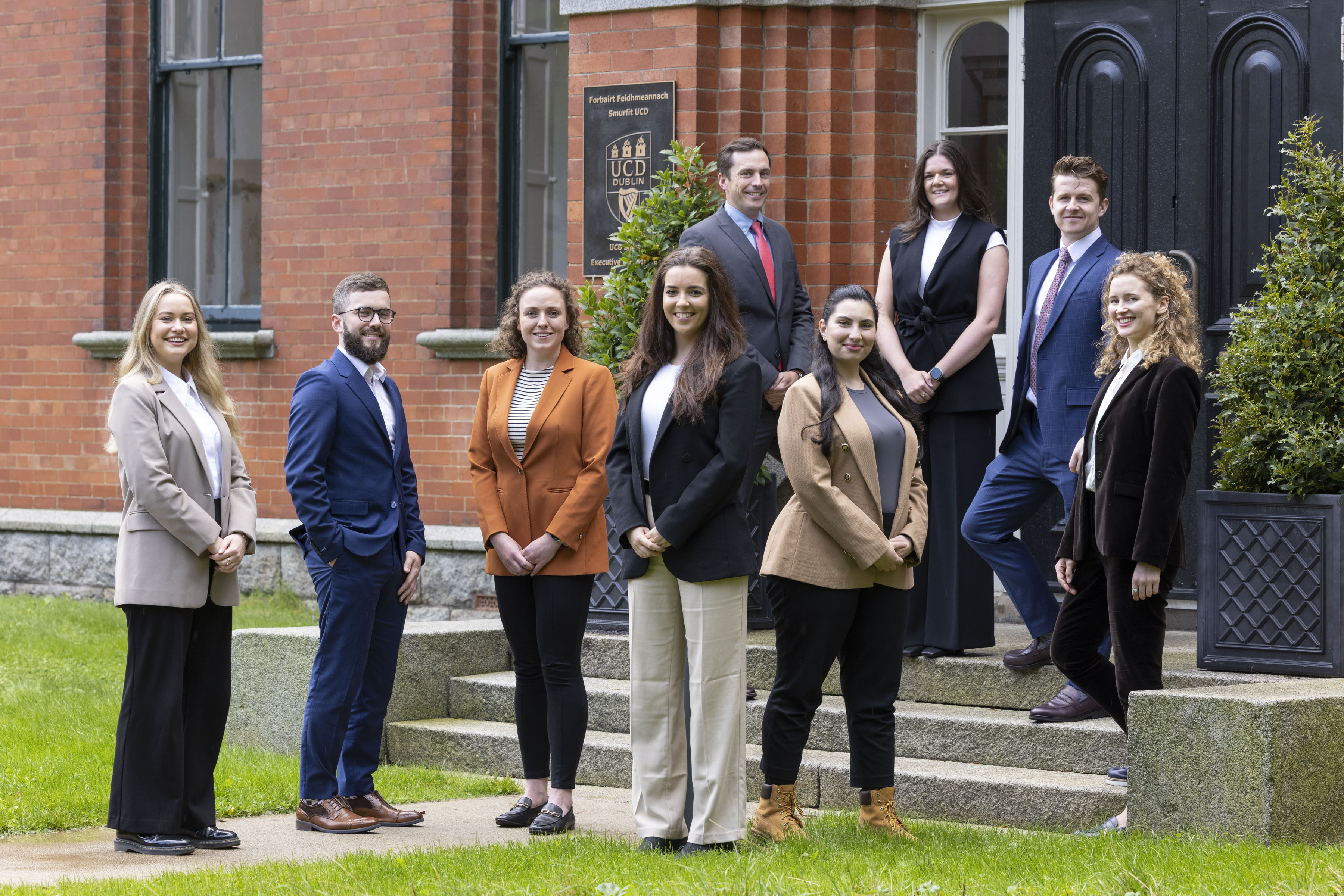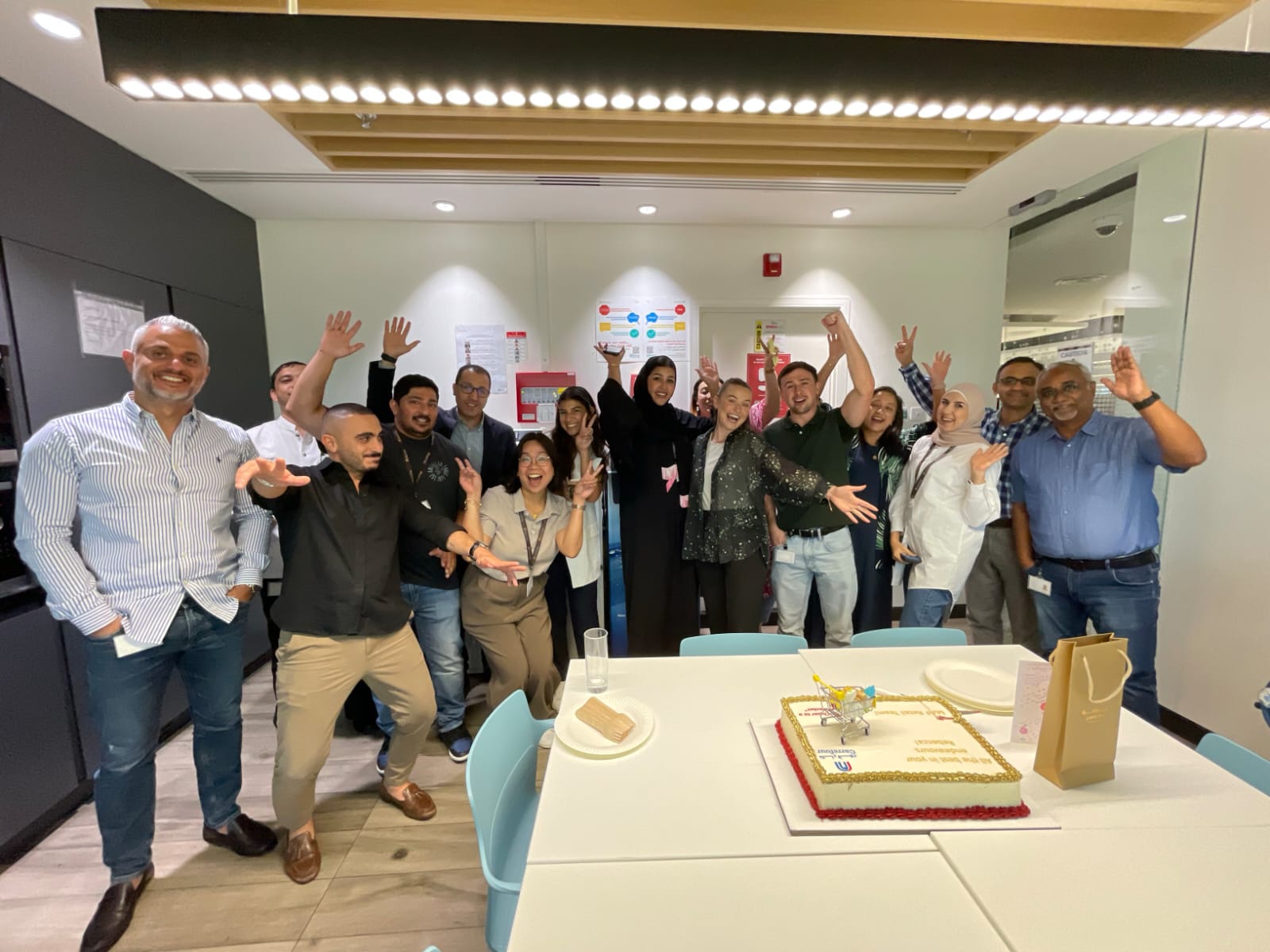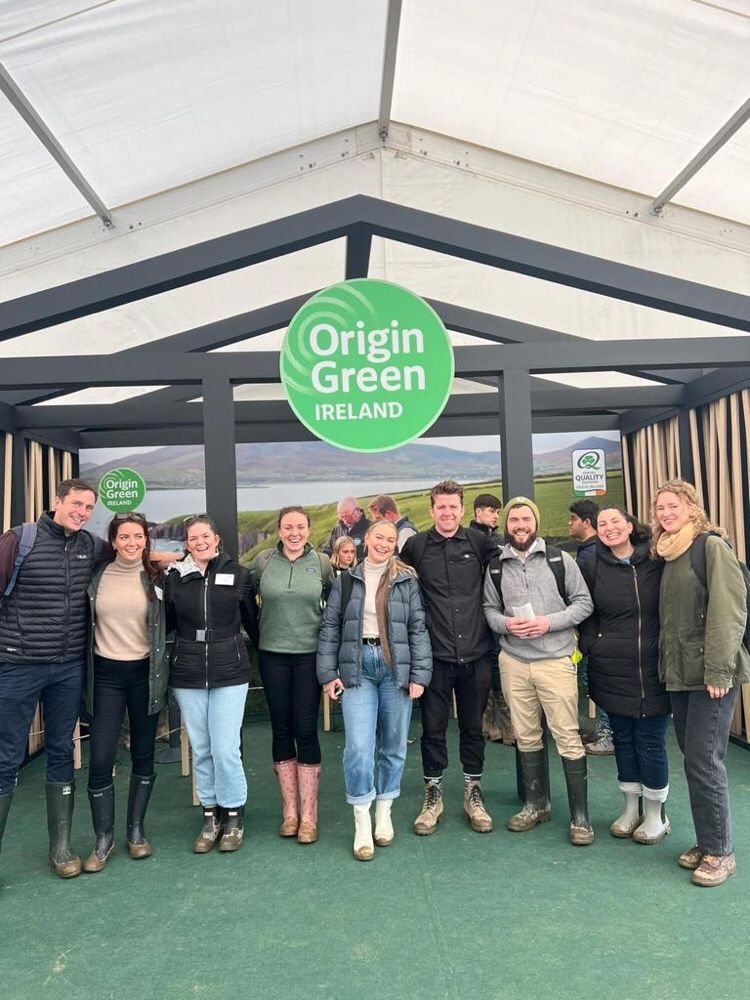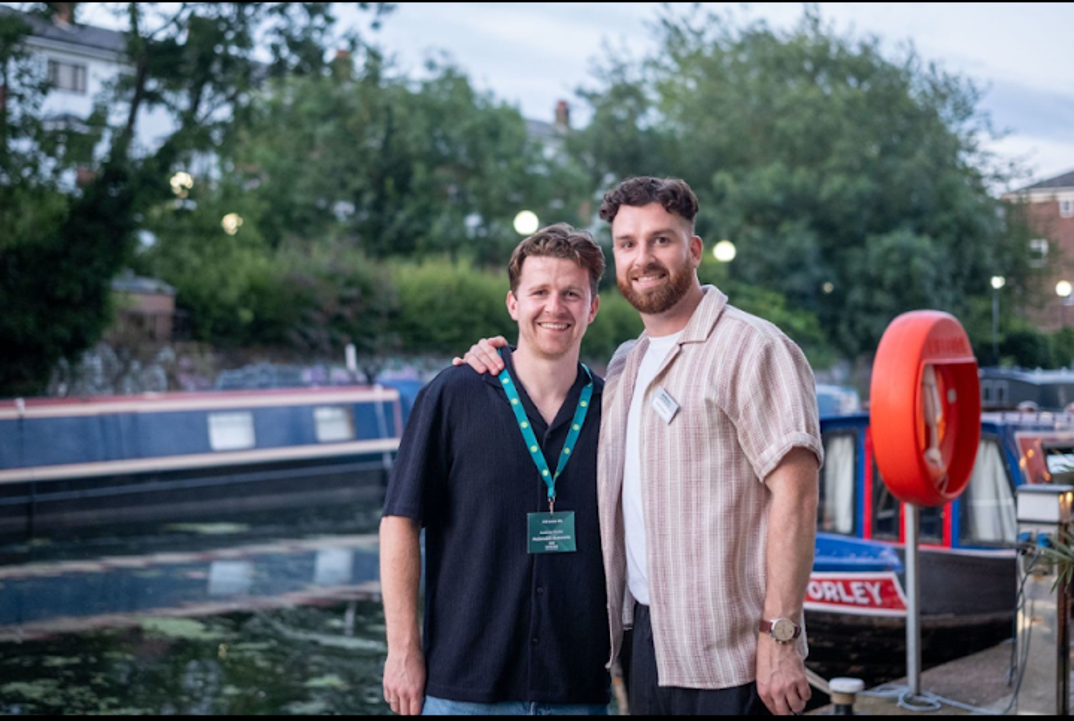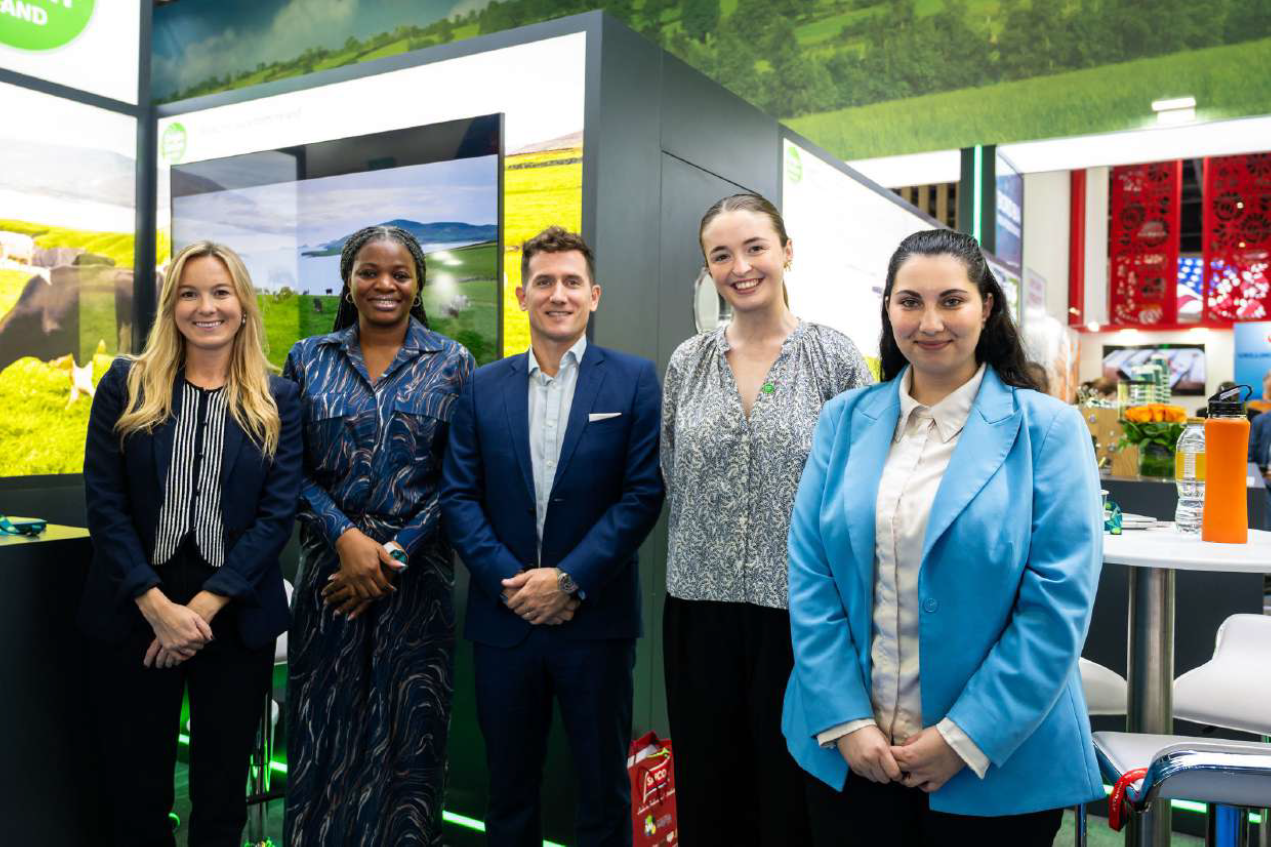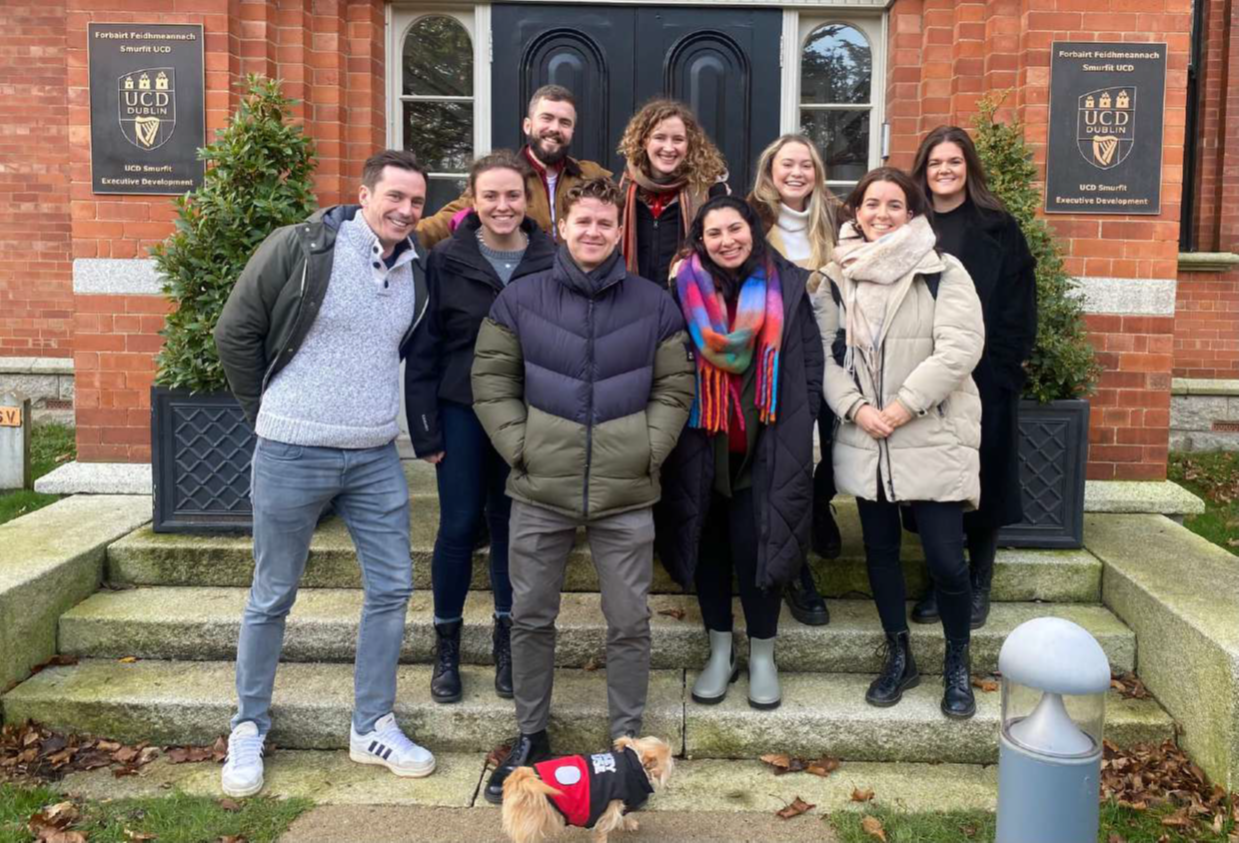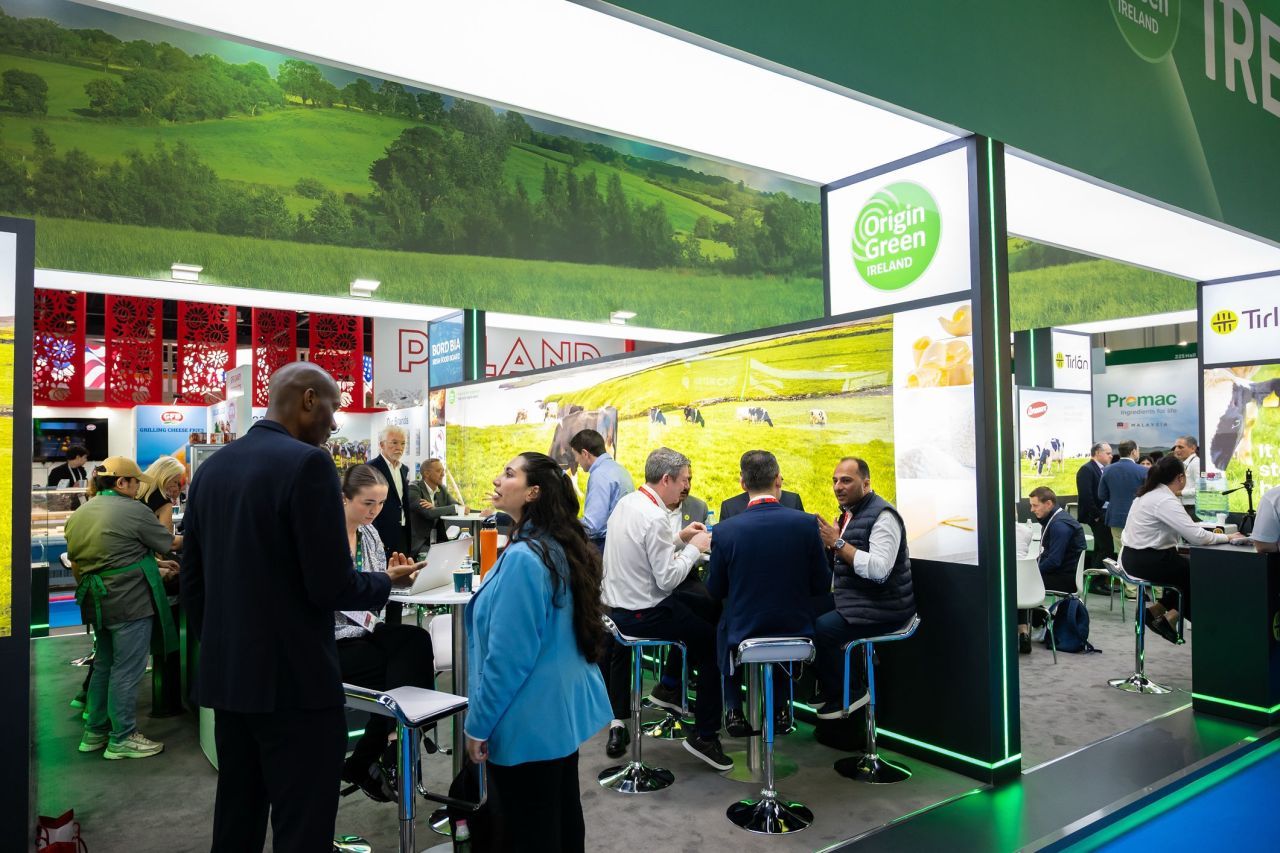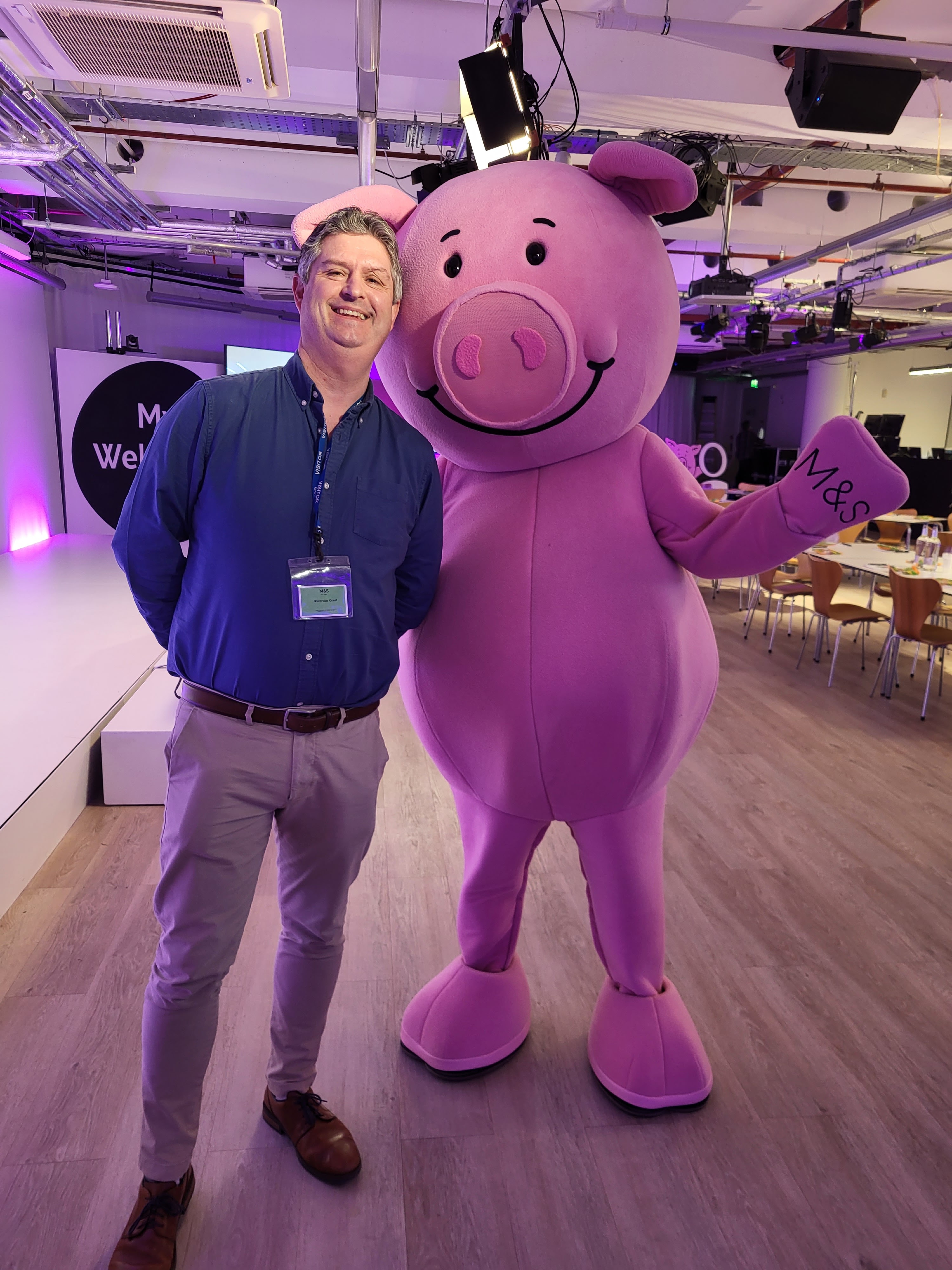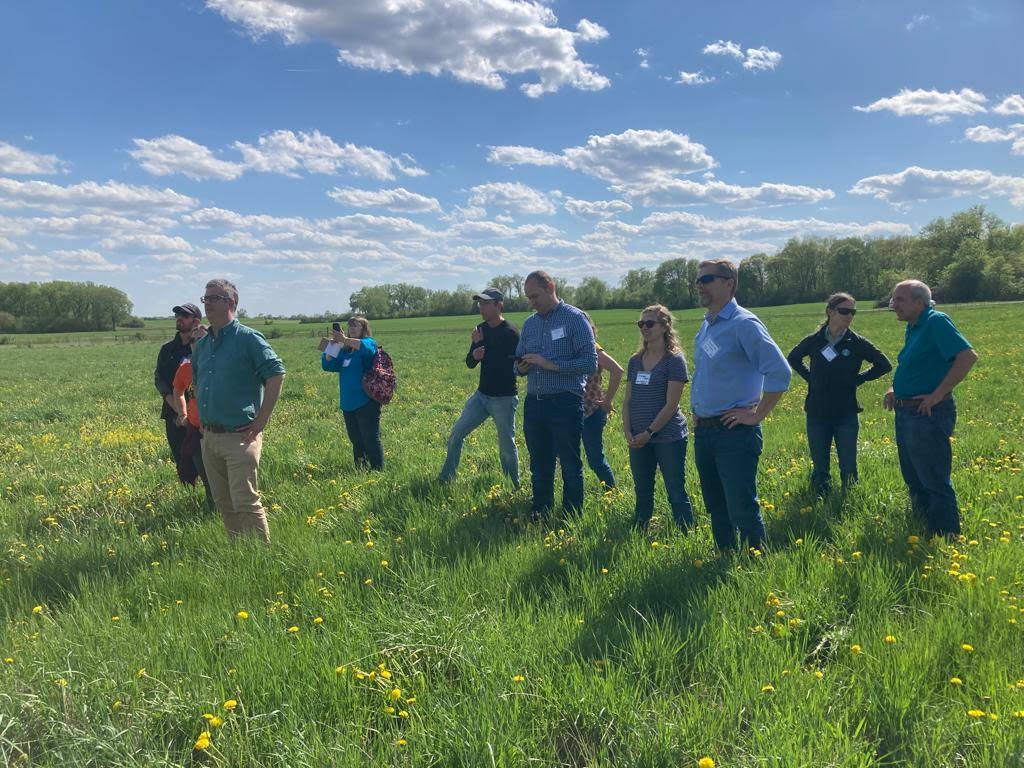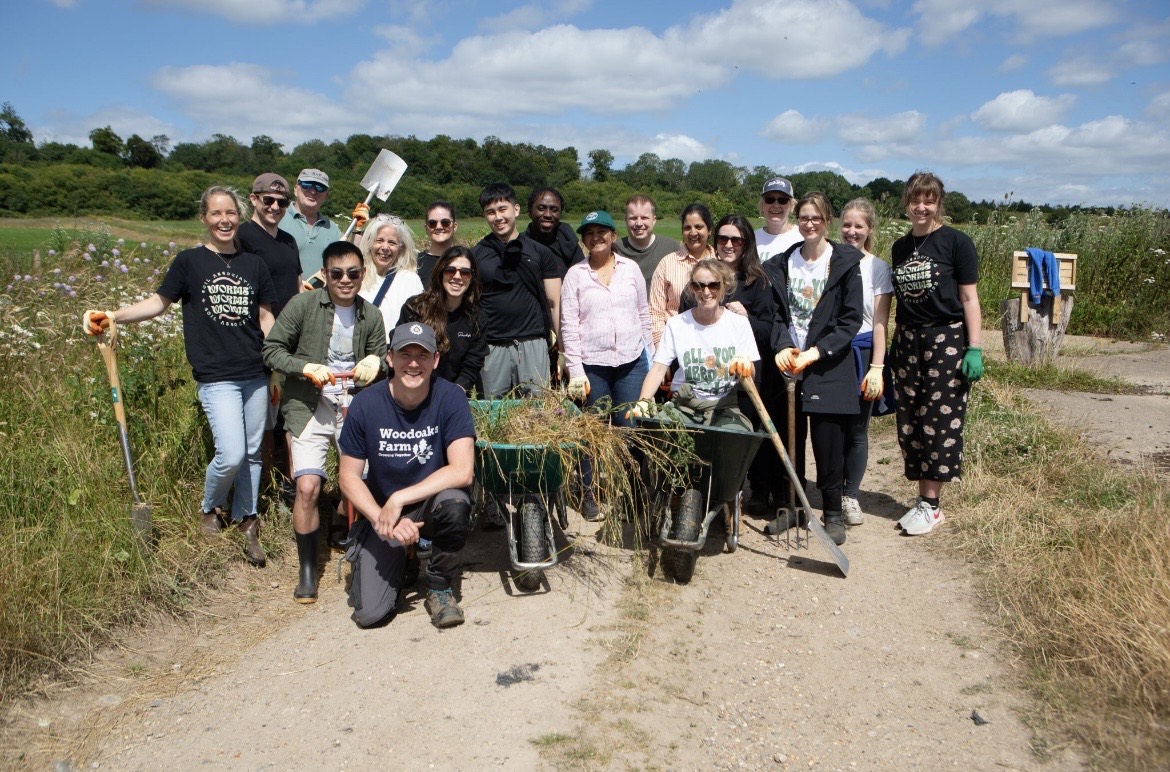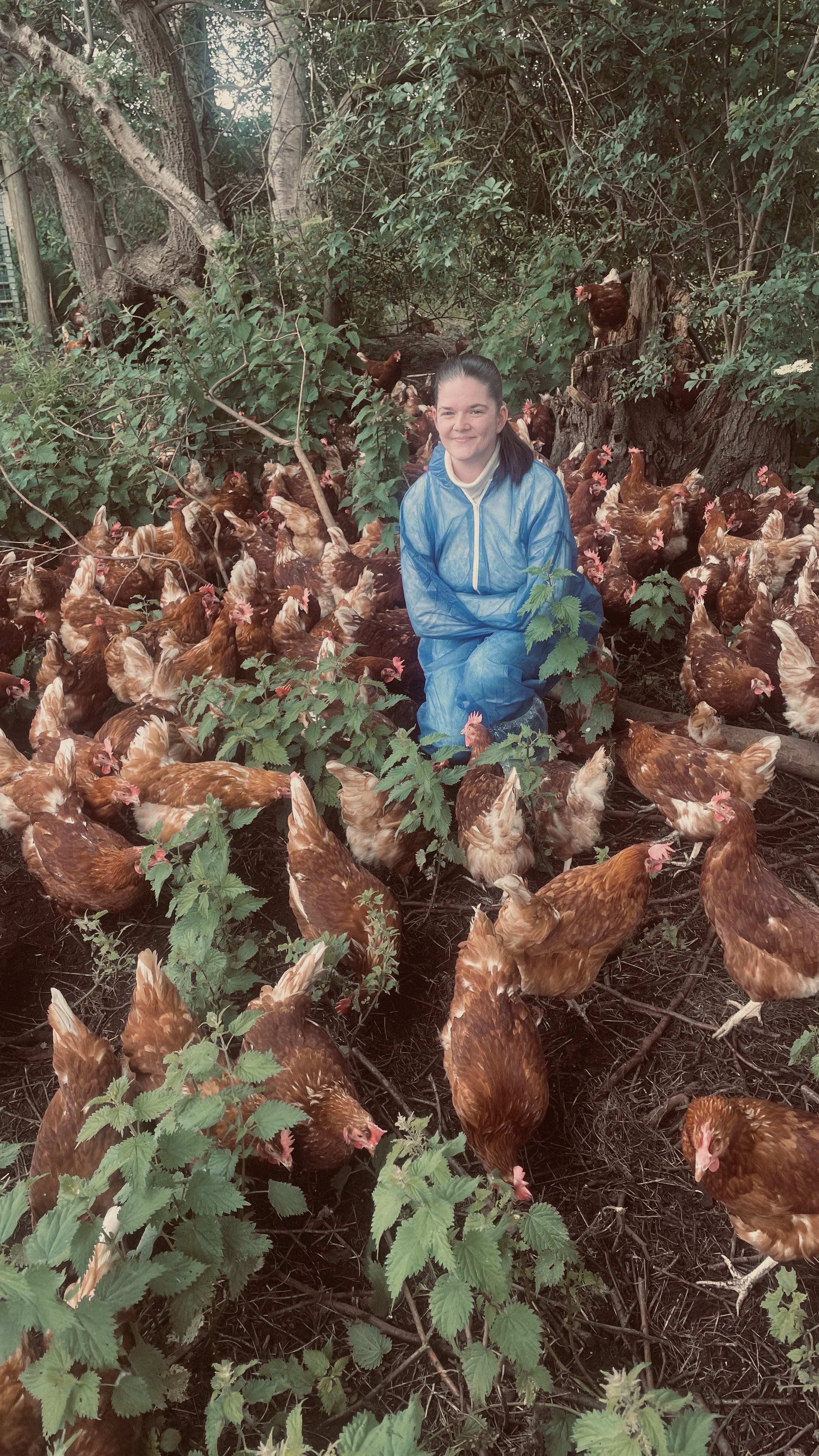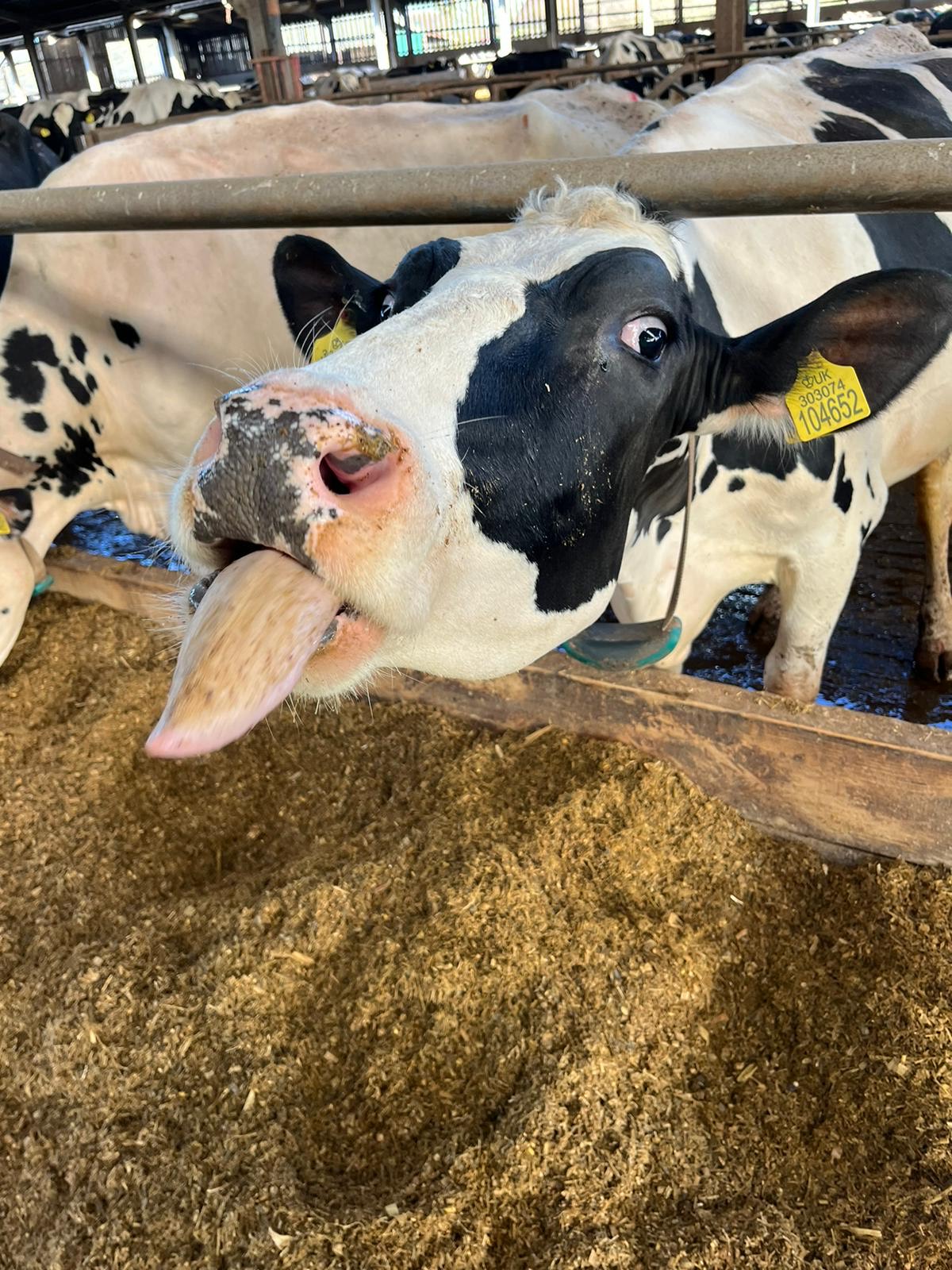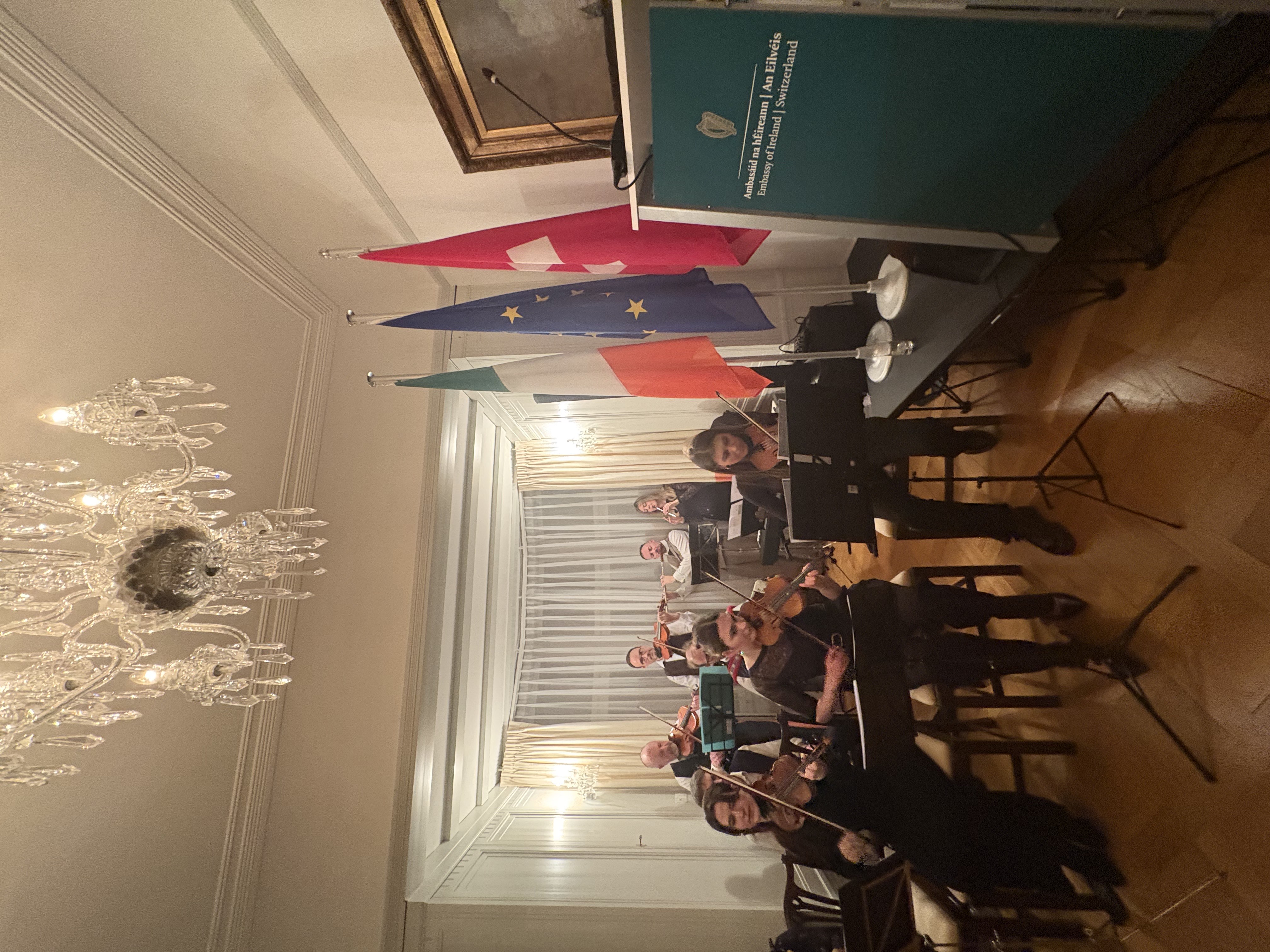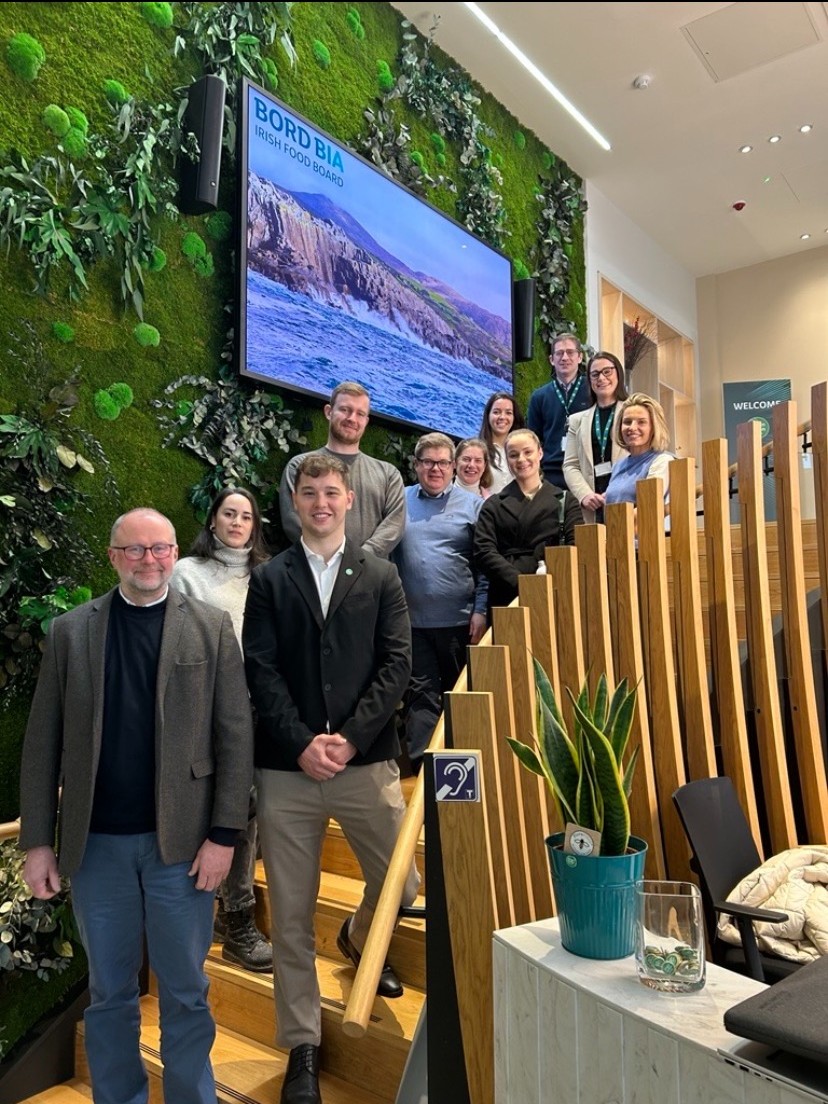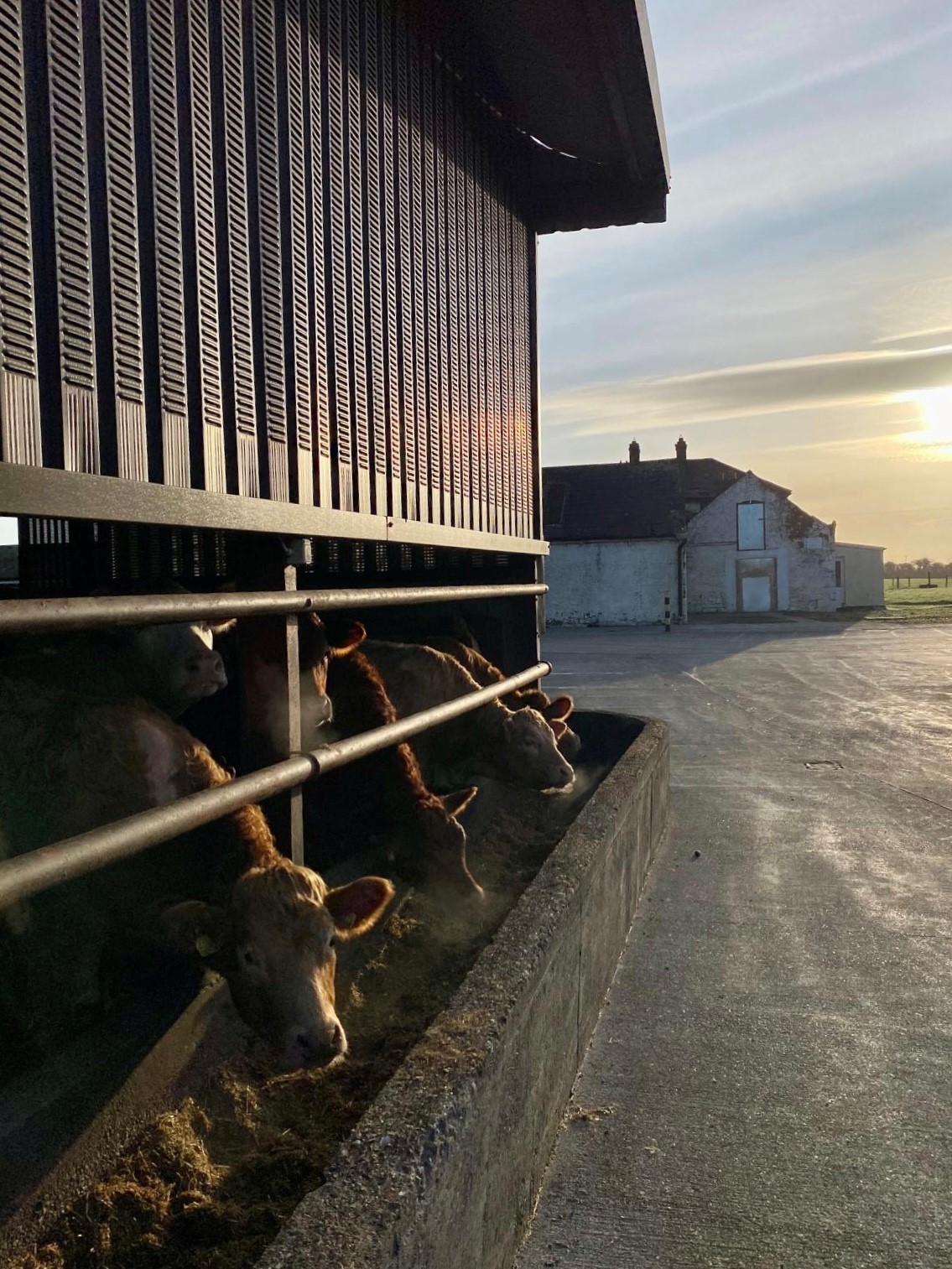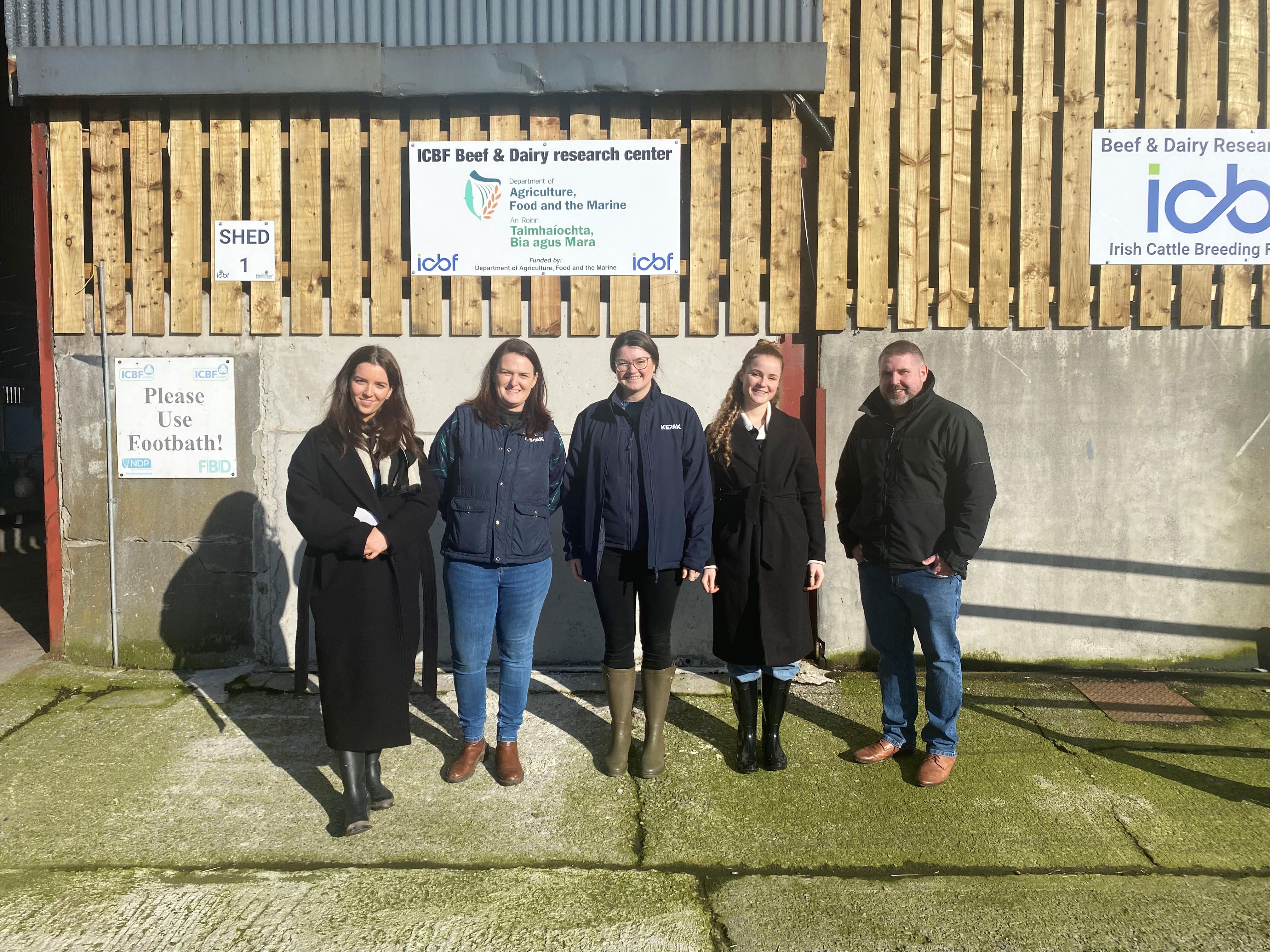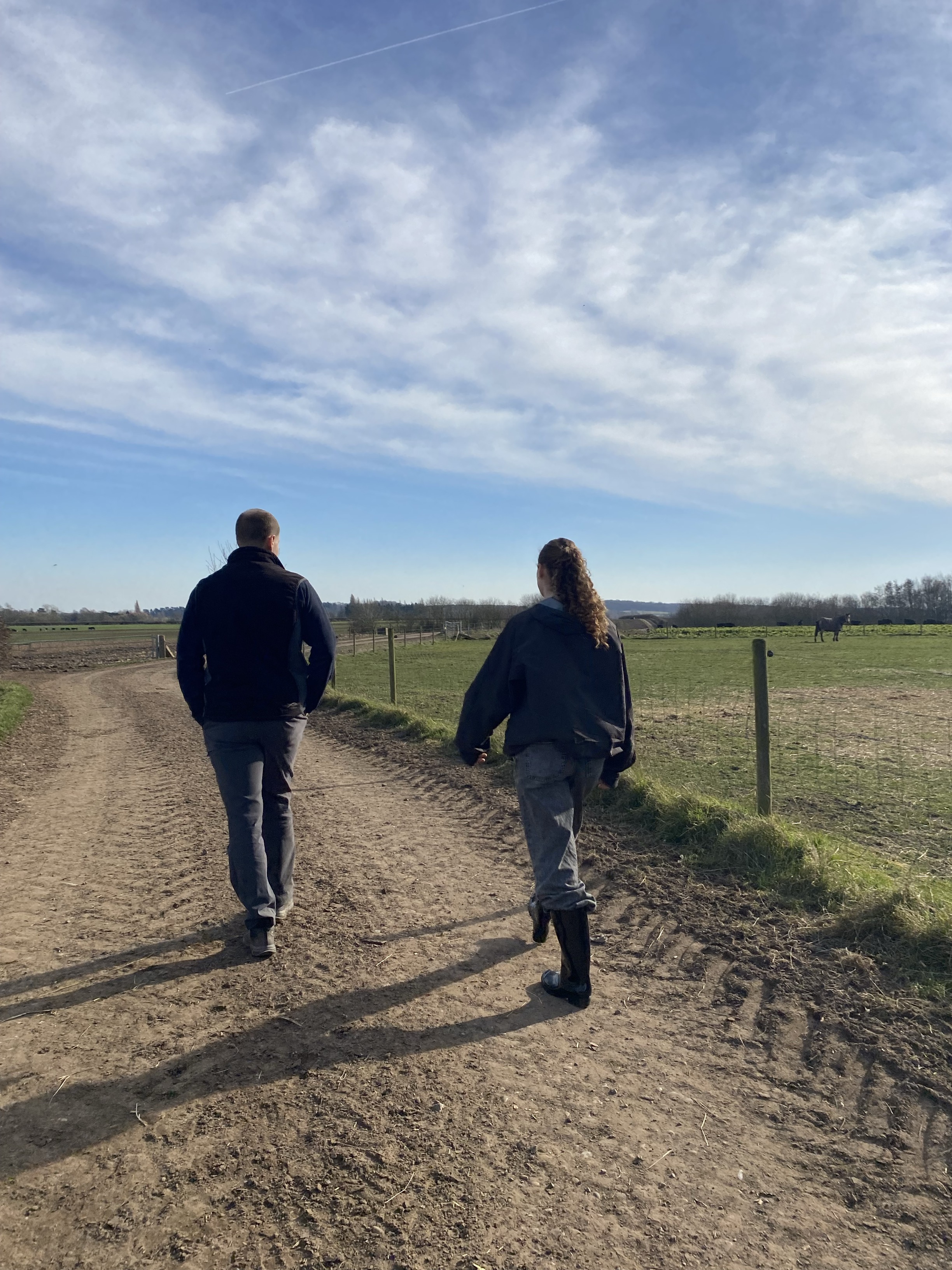Accredited Modules
The first 10 modules (2.5 credits each) will be completed during induction and the remaining 4 modules will either be in-person or online during the remainder of the programme:
Learning Outcomes
1.Demonstrate a critical awareness of sustainability and ESG issues in contemporary Irish and global society.
2.Critically appraise the current theories on sustainability that underpins sustainable living Ireland, the EU and the wider world.
3.Develop technical expertise on the components of sustainability and ESG relevant to Irish society and economy.
4.Understand ‘how it works’ aspects of themes, in addition to technical expertise.
5.Introduce Ireland’s Climate Action Plan.
6.Position Origin Green in the context of the above.
Indicative Content
The need for OGAs to understand the past, present and future of Origin Green, sustainability, ESG and their component elements is non-negotiable. This module will use the Bord Bia key topics in sustainability listing of environmental sustainability, social sustainability and economic resilience as the starting point for this module. Topics to be covered will include GHG emission, climate change adaptation, biodiversity, circular and bio-economic, organic farming and food production animal health and welfare, human and labour rights, food security and the just transition, plastics 101, emissions measurement, water management, regenerative agriculture and net zero farming technology. Use will be made of existing Bord Bia materials, external online, video resource and guest speakers as well as classroom discussion and presentation.
Learning Outcomes
After completing this module learners will be able to:
1. Understand the commercial importance of sustainability to contemporary and future Irish food, beverage and horticulture business success
2. Explain the importance of sustainability to the future competitiveness of the Irish food, beverage and horticulture industry
3. Explain the ways of thinking, such as ESG and People, Planet and Profit, about how business and sustainability interact and how these impact on the outcomes of business strategy.
4. Identify the commercial opportunities arising from sustainability for the Irish food, beverage and horticulture industry
5. Acknowledge that action on sustainability of often and interaction of individual motivations as well as instrumental considerations
Indicative Content
This module builds off Sustainability 101 by taking a commercial focus on the needs of Irish and international food, beverage and horticulture organisations. The sustainability challenges facing the planet and human society are profound and increasingly in need of urgent attention. Climate change, water scarcity, deforestation, urbanization, hunger, poverty, infant mortality, and loss of biodiversity are just some of the major challenges that “people and planet” face and need to be addressed in the years to come. These challenges have also increasingly become the challenges of agribusiness and food industries. In this module, two fundamental questions of sustainability are considered: What is sustainability? Why is it important? With global sustainability mega forces as the backdrop, we will look at different ways of thinking about how sustainability and business interact, such as ESG, the 3Ps of People, Planet and Profit, and the Sustainable Development Goals. While the module will explore the significant challenges for business when it comes to sustainability, it will also acknowledge that there are opportunities too. Finally, the module will explore how individual motivations—our own as well as those of the people we work with—can extend well beyond instrumental considerations.
Learning Outcomes
After completing this module learners will be able to:
1. Identify the primary legislative, policy and regulatory issues affecting the Irish food, beverage and horticulture today and in the foreseeable future.
2. Understand the drivers and context of major environmental issues in Ireland, the EU and wider world i.e. where Ireland stands in its compliance with relevant legal, regulatory and policy frameworks.
3. Analyse the role of different interests, stakeholders, and perspectives in the context of this regulatory environment
4. ESG and financial reporting
5. International ESG Disclosures, Frameworks and Standards including CSRD, TCFD, ISSB, EUDR, EUDDD and EU green Claims Directive
Indicative Content
This module will introduce students to concepts and applications of environmental legislation and regulation, primarily as it relates to Irish food, beverage and horticulture, but also taking a wider perspective as deemed useful to learners. It will provide the background necessary to understand the history, current practice, and potential future developments in environmental politics, regulations, legislative actions, and international cooperation. A key objective of this module is to introduce the major issues, perspectives, and controversies in environmental policy-making. This session will explore the ESG regulations being implemented within the financial ecosystem including the EU Taxonomy and the Sustainable Finance Disclosure Regulation.
Learning Outcomes
Following completion of this module, Learners should be able to:
1. Explain key concepts and principles of sustainability - environmental, social, and economic.
2. Identify and evaluate the potential of emerging technologies to improve the sustainability of the agri-food sector.
3. Critically discuss strategies in building toward a sustainable and innovative agri-food system.
4. Demonstrate a proficiency in problem-solving, presentation skills and reflection.
Indicative Content
As outlined previously, the achievement of Ireland’s climate action plan goals for agriculture, for 2030 and 2050 relies on changes to national production and farm practices but also heavily on agricultural science and agri-food innovation. Closing the gap between current achievements and 2030 and 2050 targets, requires a complex set of moves: the development of scientific solutions and the effective management of their adoption by farmers, while maintaining the economic viability of the primary producer. This module will highlight the agri-food business sustainability challenge from the agricultural perspective, identify contemporary developments in agricultural science relevant to sustainability, considering the challenges of implementation and most importantly understanding what the future landscape of science relevant in these area looks like. This module will primarily focus on Irish industry,
Learning Outcomes
After completing this module learners will be able to:
1. Understand who stakeholders are and why they are important?
2. Understand the Irish farmer as a key stakeholder and understand how to drive their engagement with sustainability and Origin Green
3. Understand the urgency of action on sustainability created by Irish Climate Action Plan, Origin Green, EU Green Deal and UN Sustainable Development Goals
4. Acknowledge the limits to action through stakeholder mapping & the materiality matrix
5. Describe the economic consequences for Ireland’s food, beverage and horticulture firms and farmers of stakeholder engagement
Indicative Content
This module will explore the importance of understanding stakeholders and the crucial role of stakeholder engagement. The module asks fundamental questions of who are stakeholders? and why are they important to Ireland’s food, beverage and horticulture firms? The module will explore and provide learners with skills in using tools including stakeholder mapping and the materiality matrix, and consider stakeholder salience and why some stakeholders, such as farmers, should receive more attention than others.
The module will examine who is a stakeholder in the context of ESG, seek to understand the objectives of diverse stakeholders, including the trade-offs that might exist across their diverse objectives. The module will look at the findings of research on the economic consequences (for firms) of stakeholder engagement and use insights from research and fieldwork to consider how stakeholder engagement can create long-term economic, reputational, and relational consequences (both adverse and beneficial). Having discussed and understood “the who” of stakeholders and “the why” of stakeholder engagement, the module what best in class engagement might look like in the Irish food, horticulture and beverage areas and how diverse stakeholders may be differently influenced (both individually and collectively) to result in better engagement.
Learning Outcomes
After completing this module learners will be able to:
1. Understand the challenges, importance and best practices of branding and communicating sustainability value elements to B2B and B2C customers
2. Describe the importance of the path through which customers obtaining sustainability i.e. through consumption/use or sustainability through participation
3. Understand how sustainability changes the nature of competition and thus drives the need for new business models
4. Measure firm sustainability strategy between four options: (i) Operator, (ii) Striver, (iii) Enthusiast, or (iv) Resonator and clarify the impact of strategy on sustainability and commercial goals.
5. Understand how to achieve commercial impact from effective sustainability strategy.
Indicative Content
Sustainability is never the ‘job to be done’ or reason to buy for the customer or consumer of a food beverage or horticulture product. Rather it is a reason to care about that product or brand. Failing to separate these understandings leads to an overestimation of the role of sustainability in the customer or consumer decision making process and ultimately market failure. This module will provide learners with a practical framework for creating sustainability strategies and new business models built on customer engagement as well as improvements in products and operations that overcomes this bias.
Learning Outcomes
After completing this module learners will be able to:
1. Acknowledge Origin Green as the principle measurement and reporting tool for Irish food, beverage and horticulture firms.
2. Understand the Key Components of Sustainability Plans: Gain a comprehensive understanding of the essential elements of a sustainability plan, including goal-setting, stakeholder engagement, performance metrics, and continuous improvement strategies.
3. Develop Strategic Sustainability Plans: Learn to design sustainability plans that align with organizational goals, regulatory requirements, and stakeholder expectations, incorporating environmental, social, and governance (ESG) considerations.
4. Assess and Mitigate Sustainability Risks: Identify potential risks associated with sustainability initiatives and develop strategies to mitigate them, ensuring the robustness and resilience of sustainability plans.
5. Measure and Report on Sustainability Performance: Learn how to set key performance indicators (KPIs) for sustainability, track progress, and report outcomes using recognized standards such as GRI, SASB, and TCFD.
6. Evaluate Financing Options for Sustainability Initiatives: Explore various financing mechanisms, carbon credits, including green bonds, impact investing, grants, and public-private partnerships, to support the implementation of sustainability projects.
Indicative Content
This module will seek to develop learner expertise in two broad area, first the important of ESG reporting and second initiating an ESG reporting process in an organisation. Particular emphasis will be placed on the dynamic nature of reporting frameworks and the need to choose the right frameworks at appropriate times to create a stack of credentials suitable to support the commercial activities of the business. Using best practice case studies learners will explore the how other firms, small, medium and large have developed sustainability reporting schemes. Particular attention will be paid to Origin Green as the primary vehicle in the stacking of credential for the Irish food, beverage and horticulture industry to begin, continue and execute their programme for sustainability measurement, reporting and financing cuts the green finance options available to corporates including green bonds, sustainability-linked bonds and transition finance. We will assess the role of rating agencies and reporting to attract and retain ESG capital and discuss how ESG is likely to impact the cost of and access to capital now and in the future.
Learning Outcomes
After completing this module learners will be able to:
1. Discuss sustainable agriculture sourcing issues, deforestation, ethical issues and human rights in particular, and relate them to contemporary customer and supplier concerns.
2. Concisely apply the current theory of procurement and supplier management to practice.
3. Provide evidence of in-depth ability to recall sustainable procurement information and knowledge.
4. Display practical skills in the production of a sustainable agribusiness sourcing and supplier management plans with a particular emphasis on prioritization of objectives.
5. Understand the role of social compliance audits.
Indicative Content
This module focuses on the principles and practices of sustainable agricultural sourcing and effective supplier engagement. Students will learn how to develop sourcing strategies that prioritize environmental stewardship, ethical labor practices, and supply chain resilience. The module covers key topics such as certification standards, traceability, risk management, and collaborative approaches to engaging suppliers in sustainability initiatives. Through case studies and interactive learning, students will gain practical skills to drive sustainability across agricultural supply chains, enhancing both environmental impact and business value.
Learners will explore all aspects of sustainable sourcing from the basics of sourcing and delving deeply into the sustainable sourcing leading edge knowledge and best practice needed to be successful leader in Procurement. Learners will explore the latest issues in sustainable sourcing including strategy, strategic sourcing, outsourcing, relationship management, international developments, ethical issues in procurement and supplier management. Information and disclosure in procurement and sustainable procurement will also be considered.
Learning Outcomes
After completing this module learners will be able to:
1. Articulate what sustainability means to supply chains for Irish food and agriculture.
2. Understanding the tools and techniques commonly used to analyse and design environmentally sustainable supply chains.
3. Identify the risks and opportunities of various sustainability strategies along the supply chain, including consumer engagement.
4. Demonstrate deeper understanding on the role of multi-stakeholder engagements as part of a successful sustainability strategy, with a particular emphasis on the role of the farmer.
Indicative Content
There is a growing pressure for Irish food, beverage and horticulture businesses to engage in sustainable practices. Consumer attitudes, NGO oversight, government regulations and shareholder expectations of the social and environmental impact of company operations are shifting at varying speeds around the world. But these expectations go beyond traditional business boundaries, and into the supply chain. The module in Sustainable agribusiness supply chains will focus on the fundamental strategies, tools and techniques required for Irish firms to analyse and design environmentally sustainable supply chain systems. Through a combination of lectures and case study discussions, participants will gain a deeper understanding on how to embed sustainability along the supply chain, how to transition from ‘eco- efficiency’ efforts into a broader design of the supply chain partners and, most importantly, how to prioritise the various dimensions of environmental sustainability – combining strategic goals with supply chain design tools and techniques.
Learning Outcomes
After completing this module learners will be able to:
1. Understand Nudging Principles: explore the concept of nudging and its foundational theories, including how behavioural science principles can be applied to influence consumer choices.
2. Align Business Goals with Health Objectives: learn to create marketing and product strategies that align business goals with public health objectives, integrating pleasure and health in a way that supports both.
3. Explore how businesses can develop strategies that use nudging techniques to promote healthier food choices while ensuring that these choices remain enjoyable and satisfying for consumers.
4. Promote Sustainable Nutrition: explore how nudging can be leveraged to support sustainable nutrition practices, such as reducing food waste and encouraging the consumption of environmentally friendly foods.
Indicative Content
This module explores how nudging techniques can harmonize business objectives with public health goals and consumer pleasure. The module covers the application of behavioural science in marketing, ethical considerations, and the impact of nudging on sustainability and consumer well-being. Through case studies and practical exercises, students will gain skills to develop strategies that align business success with improved health outcomes and sustainable practices. It will explore how this strategy can also lead to improved firm performance. Instead of making more money by selling more food to more people more often, firms could profit from selling smaller portions offering more pleasure. The result would be a win for consumers’ health, public health outcomes and enjoyment, as well as for business.
Learning Outcomes
After completing this module learners will be able to:
1. Understand Change Management Principles: gain a comprehensive understanding of change management theories and models relevant to sustainability initiatives.
2. Lead and Inspire Teams: acquire skills to effectively lead teams through change, including motivation, communication, and conflict resolution techniques specific to sustainability projects.
3. Manage Resistance and Build Support: identify and address potential resistance to sustainability changes and develop strategies to build support among stakeholders.
4. Integrate Sustainability into Organisational Culture: develop methods to embed sustainability into organizational culture, aligning values, practices, and policies with sustainability goals.
5. Foster Collaboration and Partnerships: build skills to foster collaboration with external partners, industry groups, and community organizations to enhance the effectiveness of sustainability efforts.
6. Communicate Change Effectively: master communication strategies to articulate the benefits and rationale of sustainability changes to various stakeholders.
Indicative Content
This module focuses on the leadership skills and change management techniques necessary for driving successful sustainability initiatives within organizations. Participants will learn to lead teams through change, and manage resistance effectively. The course covers integrating sustainability into organizational culture, measuring impact, and communicating change. Through practical exercises and case studies, students will acquire the tools and strategies needed to implement and sustain impactful sustainability practices.
Learning Outcomes
After completing this module learners will be able to:
1. Apply AI to Sustainability Challenges: understand how artificial intelligence can be used to address key sustainability challenges, such as data collection, waste reduction, supplier engagement and environmental monitoring.
2. Evaluate the Impact of Digital Solutions: assess the effectiveness and impact of AI and digital technologies on sustainability outcomes, including cost benefits, environmental improvements, and operational efficiency
3. Leverage Digital Tools for sustainability: gain an introduction in the platforms available today and what they can achieve
4. Data sharing with internal and external stakeholders
5. Integrate AI with Sustainability Strategies: Develop strategies to integrate AI into existing sustainability initiatives, aligning digital innovations with organizational goals.
Indicative Content
This module explores how artificial intelligence (AI) and digital technologies can drive rapid advancements in sustainability efforts. Participants will learn to leverage AI and digital tools to enhance sustainability initiatives, optimise resource management, and improve environmental outcomes. The course covers practical applications of AI in data analysis, decision-making, and process automation, as well as the role of digital technologies in creating efficient and scalable sustainability solutions.
Learning Outcomes
After completing this module learners will be able to:
1. Develop self-awareness for personal effectiveness, influence and leadership.
2. Build digital presence for effective networking in the food industry.
3. Understand the value of conscious career management.
4. Identify the behaviours of effective career development.
5. Manage their global well-being, resilience, performance and health.
6. Navigate their transition to sustainability roles in the food industry post-programme.
Indicative Content
Professional & Career Development is designed to support the OGAs in their developmental journey, with a view to preparing them to hit the ground running in the Irish food, drink and horticulture industry upon programme completion. In general, high career-achievers have a number of common characteristics: they are self-aware; they manage their careers with intent; they identify what roles/career they want; they align their current efforts and development priorities to their longer-term goals; they have a strong value-proposition; they plan their approach to their preferred employers; they are effective networking; and they are prepared.
UCD will provide ongoing coaching support to OGAs throughout the programme to ensure optimum professional and career development and retention in relevant food sustainability roles upon programme completion.
Learning Outcomes
During this module students will:
1. Develop an understanding of how to support and drive the sustainability agenda within food organisations.
2. Build competence in distilling and capturing key sustainability and export development insights of value to food industry organisations.
3. Develop expertise in communicating strategic insights to senior management and other key decision makers within the food industry.
4. Identify and develop opportunities while on placement at global food firms to support the growth of the Irish food industry.
5. Practice networking, building relationships, and developing influencing skills.
Indicative Content
Applied Projects will help the OGAs gain fundamental expertise in business sustainability and the global food, drink and horticulture industry. The module is based on action learning, a process of continuous practice, reflection and enhanced knowledge and capability. It allows the OGAs to gain in-depth knowledge of the emerging issues facing the international food industry; capture strategically valuable insights, and share these insights and opportunities to support key decision makers representing Irish food companies with the highest growth potential. The module facilitates learning through placements with the world’s leading food organisations. During the programme, OGAs will meet and network with a wide range of industry leaders, functional experts and governmental agencies to help them develop insights and opportunities, and foster real links of value to the Irish food, drink and horticulture industry. The module will facilitate learning from placement experiences complemented by in-class modules. OGAs are expected to evolve into industry experts with the ability to advise and manage change and to help the organisation respond effectively to related strategic challenges.
Outputs
Key value-adding outputs from this module will include:
1. Capture and share of insights of value to the Irish food industry.
2. Contribute directly to your host organisation(s) through working collaboratively on assignments within the host organisation(s).
3. Identify and develop opportunities to support the strategic growth objectives of Bord Bia and the Irish food industry.
4. Build sustainability technical and leadership expertise of OGAs.
Meet the Faculty
UCD Michael Smurfit Graduate Business School has one of the most highly regarded faculties of any business school in the world and the most productive researchers in the country. Rigorous, interactive, and dynamic, they present topics via a range of engaging methods, including case studies, simulation exercises, self-assessment and small group discussions. The programme’s faculty offer a blend of academic excellence, real-world relevance and practical application that provides participants with unparalleled opportunities to expand their capabilities

Damien McLoughlin is Anthony C. Cunningham Professor of Marketing at UCD Michael Smurfit Graduate Business School in Ireland. He has previously served as a visiting faculty at the S.C. Johnson Graduate School of Management at Cornell University and at the Indian School of Business. Since 2011 he has been a faculty member and researcher on the Harvard Business School Agribusiness seminar. His most recently published case studies have been C-suite case studies of Ocado and Nestlé; current cases cover areas of global food that is most significantly affected by innovation, including global sports nutrition, snacks and confectionery, breakfast cereals and home meal kits. Since 2014 he has been a visiting professor at the Stern School of Business at New York University. In 2015 and 2017 Damien was a faculty member on the Purdue University Food and Agribusiness Executive Summit. Damien has published more than seventy papers and two books on strategy and marketing issues. He has also written more than 25 case studies, mainly relating to leadership and strategy issues in global food and agribusiness, covering all geographies and major sectors.
Damien has consulted and led executive programmes in Europe, North America, Asia and Africa, while working with some of the world’s leading organisations including Alltech, Allianz, Aurivo, Bobst, Bord Bia, Charoen Pokphand Group (CP), Dairygold, DeLaval, Dawn Farm Foods, EY, Eversheds, Google, Hewlett-Packard, Independent News & Media, Microsoft, Rabobank, Ridley, Ryanair, Smurfit Kappa Group and Zespri. He is also an experienced board member, having served public and private sector organisations as a director and consultant. Damien holds a Bachelor of Business Studies degree from Dublin City University, a Master of Business Studies degree from University College Dublin and PhD in Marketing from Lancaster University (UK).

Margaret Berry is a strategic thinking and commercially minded business development lecturer and independent business consultant. She designs and delivers modules at UCD Michael Smurfit Graduate Business School delivering workshops and modules in executive education and other postgraduate programmes in subjects such as competitive strategy, maximum performance impact and key account management.
Prior to working as an independent business consultant and lecturer, Margaret held a number of strategic and commercial positions responsible for managing & implementing effective B2B account strategy regionally and globally with blue-chip FMCG companies ensuring best practice account management, consistent sales growth and margin opportunities.
Mary holds a Bachelor of Science Degree in Chemical Engineering with High Distinction from the University of Kentucky and an MBA with Distinction from Harvard Business School, where she was awarded a Dean’s Doctoral OGA for research in economics and marketing.
Professor Shelman was Director of Harvard Business School’s Agribusiness Programme. She leads the annual Agribusiness Seminar in Boston which is attended by more than 200 CEO’s and senior managers from the world’s leading agribusiness firms. She has led similar programmes in Europe, Latin American and Asia. Mary is past President of the International Food and Agribusiness Management Association (IFAMA).
Mary is known as a strategic pathfinder in the global agribusiness sector. She offers a particular competency in identifying and diagnosing the forces of change shaping global agribusiness. Actively engaging with these themes she has served as Chairman of the Board of RiceTec, Inc., a fully integrated agribusiness and packaged food company headquartered in Alvin, Texas, and on the boards of RiceTec AG, Stiftung Fürst Liechtenstein, and the USA Rice Millers’ Association.
She has also authored more than 50 case studies highlighting situations of strategic change in leading global agribusiness firms. She is a member of the editorial board of the International Food and Agribusiness Management Review.

Goutam Challagalla is Professor of Strategy and Marketing and dentsu Group Chair in Sustainable Strategy and Marketing at IMD Business School, Switzerland. He focuses on how digital advances and sustainability concerns are impacting companies’ business strategies and approaches to marketing. Having helped companies to rethink their business models and build new capabilities in the face of the digital revolution, he is now helping to integrate sustainability-related challenges and opportunities into their strategy.
His teaching, consulting and research highlight the different challenges facing companies as a result of digital and sustainability transformations. While digital advances require the development of new business models in order to become more effective or efficient, taking on sustainability goals means that organizations have to rethink their whole raison d’être and their relationship with all stakeholders.
Digital is about skilling, doing things faster and cheaper, and building new business models. Sustainability requires you to rethink your fundamental purpose, who you are as an organization, and what your place is in the hearts and minds of your customers and other stakeholders.
His work on sustainability strategy with Frédéric Dalsace has demonstrated that there is only a narrow path to success on sustainability, and most firms and brands are not able to find this because they make crucial mistakes as they pursue their agendas. A recently published HBR article by the pair sets out a practical framework for creating sustainability strategies built on customer engagement as well as improvements in products and operations.
Before joining IMD in 2015, Challagalla served for 20 years as a marketing professor at the Georgia Institute of Technology (Georgia Tech) in Atlanta, where he was Associate Dean for Executive Education and head of the marketing department. He also worked as Principal at The Monitor Group, a strategy and marketing consulting company.

Mark Pagell holds a Chair in Global Leadership and is a Professor of Sustainable Supply Chain Management. He is also an Adjunct Scientist at the Institute for Work and Health in Toronto, Canada. Prior to joining UCD he was a Professor of Operations Management and Information Systems at the Schulich School of Business at York University in Toronto, Canada. And he spent the 2009-2010 academic year at University College Dublin on a Marie Curie International Incoming Fellowship studying sustainable supply chain management. He received his PhD in Operations and Sourcing Management from Michigan State University in 1997.
Dr. Pagell conducts research on topics such as sustainable supply chain management, human resource issues including employee safety in operational environments, and operational responses to environmental uncertainty. Dr. Pagell has published over 55 peer reviewed journal articles in a number of premier outlets including: Journal of Operations Management, Production and Operations Management, International Journal of Operations and Production Management, Journal of Supply Chain Management. Dr. Pagell's research has won a number of awards including an Emerald Citation of Excellence Award (2013), best papers published in the Journal of Supply Chain Management (2009), International Journal of Operations and Production Management (2005) and Journal of Operations Management (2002) as well as best Operations Management paper at the Academy of Management meetings in 2001 and 2003 and best paper in the Sustainability track at the Decision Sciences meetings in 2008 and 2011

Carlos Cordón is Professor of Strategy and Supply Chain Management in IMD, Switzerland. His areas of expertise are supply chain management, digital, value chains, digital lean, and process management, all of which are particularly relevant topics in the context of the supply chain challenges that businesses face today. His research and teaching are currently focused on the reconfiguration of supply chains in the face of persistent disruptions, how supply chains are driving revenue, reshoring and onshoring, and digital strategies.
Cordón says supply chain constraints have become a driver of extraordinary growth in profits for some companies as a result of availability constraints, increased demand, and higher prices. General Motors sold 20% fewer cars in 2021 than in 2019 as a result of a shortage of microchips, for example, but still managed to record a 48% rise in profits over the same period.
He is the author of numerous articles and case studies in his specialist fields and has won various awards for his work. He was named on The Case Center list of the top 50 best-selling case authors globally in 2021/22 and was a winner in the 2017 EFMD Case Writing Competition with IMD colleagues Benoit Leleux and Beverley Lennox for a case study on Adidas.
He is also the author of four books, including the 2016 title Strategy is Digital, which explores how companies can use big data in their value chains. The book presents strategies and practices to allow companies to take advantage of the huge business opportunities arising from the advent of big data and guides them through their big data journey. Cordon notes that supply chains are being disrupted but they are also becoming drivers of extraordinary growth. Price increases and availability constraints have enabled some organizations to deliver record profits.
Cordón is a consultant to multinational companies in the electronics, food, chemical, pharmaceutical, and automotive industries, among others. He has designed and directed numerous executive development programs and has helped some of the world’s biggest companies to develop their supply chain and digital strategies, including Johnson & Johnson, Nestlé, Coca Cola, Merck, Mondelez, Unilever, Heineken, Philip Morris, Danone, and Reckitt Benckiser among others. He is also a member of the Coca-Cola European Partners’ Digital Advisory Board.
He joined IMD in 1993 after completing a PhD in management at INSEAD. He was previously a manager in Accenture’s manufacturing and distribution consulting group and MIS Manager at Grupo General Cable in Spain (now part of the Prysmian group).

As an undergrad Dr. Pierce studied animal science at UCD from 1997 to 2001 in what was called the Faculty of Agriculture at the time. She grew up on a beef and sheep farm in Co Wicklow. She came to UCD to study Agriculture Science and did a PHD in pig and in 2004 began working with Brett Brothers feed mill in Callan, Co Kilkenny as an animal nutritionist. Karina has taught in UCD for over 13 years. She is the Associate Professor Dairy Production for the School of Agriculture and Food Science area inspiring youths about the industry on a world-wide scale.
Prof. Pierce is a 2019 Nuffield scholar, a two-year programme that affords a global view of agriculture. Karina travelled to 11 countries in 12 weeks including Singapore, Japan, Indonesia, France, Canada, US, Australia and New Zealand. Across those countries she saw agriculture in all its forms which have opened her mind to identify opportunities for Ireland. Sustainability was the key topic in every country she visited and she presented her report at the national conference in 2020.
Karina’s session covers the fundamentals of farming in Ireland and the Agricultural sector with the challenges facing the industry. Topics discussed in depth are dairy farming and its environment, beef systems, sustainability agricultural enterprises in Ireland and abroad.

Professor N. Craig Smith has been on the INSEAD faculty since 2007 as the INSEAD Chair in Ethics and Social Responsibility at INSEAD in Fontainebleau, France. He was previously on the faculties of London Business School, Georgetown University, and Harvard Business School. At INSEAD, Smith teaches MBA and executive courses in business ethics, compliance, strategic corporate social responsibility and sustainability. He is also the Programme Director for the Healthcare Compliance Implementation Leadership Programmes and the Impactvise Sustainability Programme for Legal Professionals.
Professor Smith’s research is at the intersection of business and society, encompassing business ethics, corporate social responsibility, and sustainability. His current research projects examine the pharmaceutical industry response to the Covid19 pandemic, business and human rights, the “price-tag society”, Rawlsian business ethics, sustainable consumption, and whether employees will sacrifice pay to work for more socially responsible firms.
He is the author, co-author or co-editor of eight books and over fifty academic journal articles, as well as over fifty case studies, including many award-winners and best-sellers. His most recent books are: The Moral Responsibility of Firms (with Eric Orts; Oxford University Press, 2017) and Managing Sustainable Business (with Gilbert Lenssen; Springer, 2019). As well as a regular speaker at international conferences, he conducts workshops and consultancy assignments with various organizations on business ethics, compliance and corporate responsibility/sustainability, including board level workshops on sustainability.
Edel completed her PhD in 2014 having been awarded the Teagasc Walsh Fellow Scholarship. The focus of her PhD research was on Irish dairy farms examining adoption of land management practices using qualitative and quantitative national data. Prior to joining UCD in 2016 she has worked on national and international research projects. The FLINT FP-7 funded project was a pilot project in nine European countries, it addressed the selection and design of Farm Level Indicators in New policy Topics, measuring sustainability at farm-level. Edel also worked on an international collaboration addressing trust in food system during a food crisis, funded by safefood, entitled Trust Makers Brokers and Breakers. This was in conjunction with UCC, University of Flinders in Australia, University of Kent and University of East Anglia in the UK. More recently her work is focused on agri-environmental projects. AgriBenchmark is a collaboration between UCD, Teagasc and the EPA, it is funded through the EPA and is examining the development of nutrient management benchmarks. She is also working on the UCD seed funded project Environmental Data and Irish Agricultural Sustainability (EDIS). The EDIS project explores the combination of national data to support the development of new environmental indicators for the Irish context. More generally her research interests address cross-cutting topics, specifically technology adoption and innovation at farm level and the link between our science, our farms and our food. Communicating environmental sustainability issues at farm-level and the importance of soil and water as key natural resources in a grass based system are two areas her research interests revolve around with a focus on the impact of policy. Further research interests examine reducing dependence on non-renewable inputs at farm level with a focus on improving competitiveness through examining new business models for Irish farms.
Russell is a Partner in KPMG Ireland and leads KPMG Sustainable Futures, the firm’s dedicated sustainability advisory practice.
Sustainable Futures is a dedicated cross-functional team of experts which helps corporates and public sector clients respond to the climate and sustainability agenda.
Russell has a BA BA (Hons) Management (First Class) and M.A (Cantab) from Trinity Hall Cambridge as well as a Diploma in Corporate Finance from ICAEW.
Russell has over 15 years experience in the low carbon and sustainability sector, including significant track record of developing decarbonisation and sustainability strategies for major corporates and semi-state organisations. This has included significant support on sustainability reporting including CSRD, CPD & Origin Green, among other reporting frameworks.
Russell has a particular focus on the sustainability challenges of the agri-food sector and has supported a wide range of agri-food companies develop sustainability and decarbonisation strategies, as well as produced a wide range of reports and thought-leadership on the sector. This has included “An Economic Impact of the Decarbonisation Agenda on the Irish Agri-food sector” for the Irish Farmer’s Journal (2024), “NI agri-food ammonia emissions impact study” for the NI Dairy Council (2024) and most recently development of an agri-sector centric National Biomethane Strategy for Ireland on behalf of DAFM & DECC.
Russell also leads KPMG Ireland’s energy advisory practice, with extensive experience in UK and Irish energy advisory work, including fundraising and M&A across a wide variety of technologies such as large- and small-scale wind, offshore wind, solar, wood biomass, anaerobic digestion, autoclave, and gasification.
Russell has significant presentation and lecturing experience and has delivered session for the Origin Green Ambassadors Programme, Finance Leaders Sustainability Accelerator and Bord Bia Leaders Sustainability Acceleration Programme over recent years.
Russell has extensive experience in the ESG sector, including:
- Lead partner overseeing the semi quantitative National Climate Change Risk Assessment for Ireland (EPA)
- Lead partner in delivering the 2nd Statutory National Adaptation Framework (NAF) and associated Sectoral Adaptation Planning Guidelines
- Lead partner in the development of Irish’s national biomethane strategy (DECC / DAFM)
- Lead partner in the provision of support to 23 Irish local authorities as they developed their CAPs.
- Lead advisor on the development of a green gas decarbonisation strategy for a leading natural gas producer in Europe
- Lead advisor to leading Irish semi-state on the transformation of its business from a fossil business to a green solutions company.
- Lead advisor on the development of an economic impact assessment of decarbonisation ambitions for the Agri food sector, both in NI and RoI.
- Lead advisor on Project Clover: an industry initiative led by Danone to decarbonise the dairy industry and wider agriculture sector using biomethane and its by-products.
- Development and implementation of a sustainability strategy for a leading Irish agri-food client
- Lead advisor to Statkraft Ireland on partnering with Copenhagen Infrastructure Partners to develop up to 2.2GW of offshore wind energy in Ireland.

Conor has been responsible for the design and delivery of executive talent development and strategic support programmes for our industry partner clients. Through his role, he has worked for over 20 years supporting the professional and career development of both recent graduates and experienced executives.
Conor holds a first-class honours MBA from UCD Smurfit School, a BComm from NUI Galway and was placed first in his class on UCD Smurfit School’s Marketing Practice Programme. He was awarded first-class honours in the Professional Diploma in Organisational Change & Transformation at UCD Smurfit School; first-class honours in the Professional Diploma in Business & Executive Coaching; and is currently completing the MSc in Business & Executive Coaching.
Non-Accredited Modules
In addition to the academic taught modules, the participants will also complete the below not-for-credit modules:
- Acute sustainable and commercial skills development sprint week
- The effective sustainability professional
- Understanding the primary producer and the Irish farm supply chain
- Sustainability data collection, management and analysis
- Food science master class series
- Communicating sustainability to internal and external stakeholders
- Buyer insights for retail and food service
- Communicating with influence
- Project management in sustainability environment
International Placements
Each participant will have 2* overseas learning assignment placements (*subject to change)
This element of the programme is designed specifically for participants to learn alongside global firms in the area of sustainability. We partner with leading international food companies to provide participants first-hand experience of solving challenges and implementing sustainability programmes. Each placement will be 7-8*months in length. (*subject to change)
Example companies: Starbucks, Nestlé, Danone, McDonalds, Coca Cola, Subway, Ahold, Costco, Sainsbury’s, Five Guys, Diageo, Marks & Spencer, Mars, Tesco, Alibaba, Sodexo, Bidvest, Bunge, Pepsico, among others


